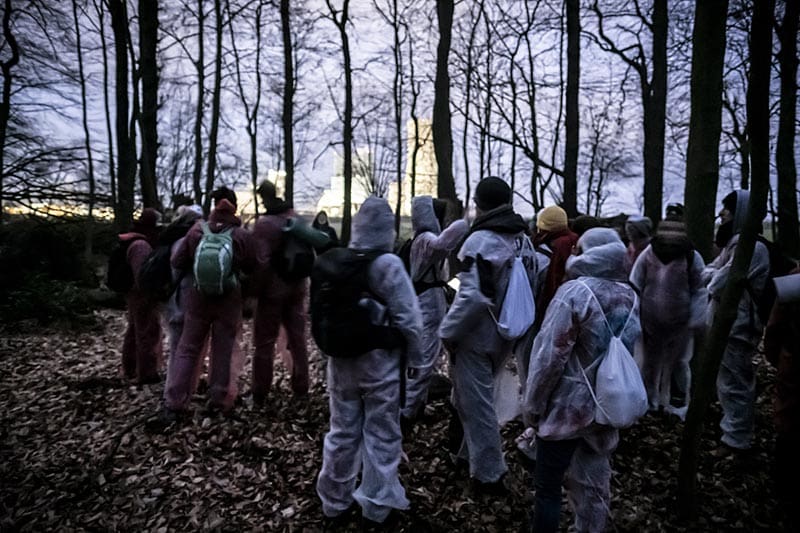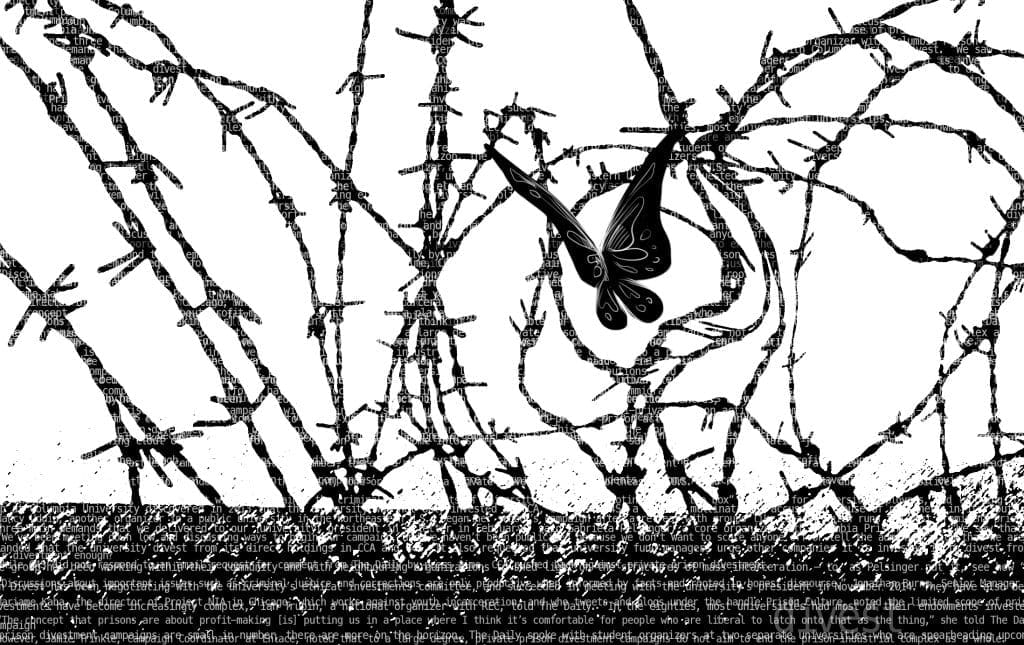Transcribed from the 18 March 2020 episode of This is Hell! Radio (Chicago) and printed with permission. Edited for space and readability. Listen to the whole interview:
In a region such as the Middle East, which is hot and sweltering, it’s very hard to imagine foreign presence and garrisons without, for example, water desalination devices that are coal-fueled. You cannot sustain a foreign army without an empire of condensers that burn this fossil fuel and allows for steam navigation and for European troops to stay cool—you could not have imperialism and colonialism without ice machines.
Chuck Mertz: We have many misconceptions about energy. We believe we move from one age of one energy source and on to another. We believe that actual source causes environmental devastation, seemingly taking all political agency out of how we use energy, which is somehow viewed apolitically.
Here to tell us how we got to where we are with energy, and its impact on the entire planet, On Barak is author of Powering Empire: How Coal Made the Middle East and Sparked Global Carbonization. On is co-founder and co-editor of the Social History Workshop, a weekly blog published on the Ha’aretz website analyzing current Middle Eastern affairs through the lens of contemporary historical research. He’s also author of the 2013 book entitled On Time: Technology and Temporality in Modern Egypt.
Welcome to This is Hell!, On.
On Barak: Thank you, Chuck. Good to be on the show.
CM: You write, “The Middle East, which is now mostly associated with oil extraction and American power, was in its history turned into a coherent region by British coal and imperial interventionism. This legacy provides an opportunity for a reappraisal of the entanglements of energy and empire, of classical- and neo-imperialism, and of coal and oil. Unsettling the familiar geographies of extraction and combustion, coal’s peculiar Middle Eastern career exposes both these processes and the connections between them to inquiry. In short, it should help us understand the complex process by which the hydrocarbon economy was created and globalized.”
Was the British coal and imperial interventionism in the Middle East—was that seeking oil? Were they seeking yet again a new energy source? Often when I hear people talk about the British empire and their involvement with the Middle East, it seems to be focused around oil, and rarely does it discuss coal.
OB: I think that’s true for many people. When most of us think about the Middle East, we immediately associate the region with oil. But I argue that the very middle-ness of the Middle East is a product of British coal—not oil extracted from the region and going outside, but rather a fossil fuel that comes from under the British isles coming into the region. A series of coaling depots that facilitated British-India traffic—from London, Gibraltar, Malta, Port Said, Aden, and Bombay—is actually what creates the middle-ness of the Middle East and what makes it a strategic region that imperialism is interested in.
CM: We blame the global fossil fuel economy on the Middle East. What do we miss when we do not hold the British empire and its history responsible for fossil fuel use and its role in contributing to climate change?
OB: We miss the fact that climate change has a deeper history and that this history is implicated with imperialism. One of the titles I played with for my book was Coalonialism; that word tries to wed together energy and empire and to think about the proliferation of the first fossil fuel—that is, coal—as an imperial strategy.
In the beginning of the nineteenth century, the British empire was not very interested in fossil fuels; it was often interested in land grabs, and it created these coaling stations, these fueling stations, as an excuse to capture territory and footholds in new regions, thereby facilitating its imperial expansion.
CM: Can you have colonialism without coal? I like your earlier title; you use the word in your book, coalonialism. Can you have colonialism without coal?
OB: I don’t know about other places, but in a region such as the Middle East, which is hot and sweltering, it’s very hard to imagine foreign presence and garrisons without, for example, water desalination devices that are coal-fueled. You cannot sustain a foreign army without an empire of condensers that burn this fossil fuel that comes from the British isles and allows for steam navigation and for European troops in places like Aden on the Arabian peninsula and Port Said and elsewhere to stay cool—you could not have imperialism and colonialism without ice machines.
We think of the age of the steam engine, and of coal itself, as a generator of heat. But coal-burning devices also produce cold. Without ice machines you cannot have steam navigation, because you cannot have people working in the sweltering, horrible conditions in the boiler room requiring ice baths when they faint and have to be resuscitated in the upper deck with ice that was produced by these coal-fired ice machines. In an environment that is hot, that is sweltering, you absolutely require these kinds of devices.
This is to say nothing of the broader political economy and the shift to cash crops. When we think of a place like Egypt in the nineteenth century, we immediately associate it with long staple cotton—this cotton is increasingly dependent on perennial irrigation that is itself, in turn, dependent on steam pumps. Right around the time when the British isles undergo an industrial revolution that uses steam engines in factories, imperial peripheries—such as many places in the Middle East—undergo an agrarian industrial revolution that is just as dependent on coal and steam engines, and that is part and parcel of the global imperial economy that the British empire is orchestrating in regions such as the Middle East and elsewhere, in south Asia and many other places.
CM: But we view these technologies—like refrigeration, for instance—as something that helps end human misery, because we have the ability to freeze our food, to keep our food for a longer period of time. But when I see them through your eyes, through your writing in your book, I see these as technologies of imperialism, technologies of building empire.
Why do we view these as only technologies of ending human misery and not see their use when they are applied within colonialism and the subjugation of other people?
OB: That’s a great question. I should make very clear that technologies like cooling devices and refrigerators and steam engines can be put to very valuable and auspicious uses. Cooling muscles, cooling foods increases life expectancy, allows sustaining and growing populations, and so on. But these technologies also can be put to many other uses. Early refrigeration devices and the possibilities that they open up for, say, cooling food also launched global carnivority: the vast shift in the nineteenth century to a protein-based diet, to eating animals.
Animals during the nineteenth century gradually cease to become engines, and increasingly become fuel or food; they stop becoming driving forces and workers, and increasingly become food and meat. If we think about the contribution of this process to global warming, that certainly makes a tremendous impact.
What other aspects of coal—such as its materiality, its weight, its connection to imperialism, its connection to other driving forces that are supposedly left in coal’s past but actually are accumulating as coal gathers force—what do all these stories create and how does that affect history?
Every technology can be put to multiple uses, but especially these coal-fired technologies are traditionally considered to be labor-saving devices. The steam engine is supposed to make redundant the reliance on manpower and on human muscle. But in fact, when we look carefully, we see that rather than a shift between energy regimes and a series of energy transitions animated by these technologies, we actually see an intensification in the reliance on manpower and human muscle, and an intensification in biomass and the various kinds of reliance on the muscles of animals.
Seen through the eyes of the planet, if you will, that has tremendous repercussions for our condition today. If we are yet to see an energy transition, in the sense of leaving an energy source behind—if our story is actually a story of accumulation and intensification—then also moving forward we have little reason to expect a post-oil or a post-fossil fuel future. History does not demonstrate that we have left anything in our past. We are only accumulating.
CM: I want to get to that point about resource transition in a moment. But you mentioned meat-eating. You write, “To provide increasing quantities of meat to the growing troop and steam passenger traffic in Aden, the British eventually took over Somalia, which became known as ‘Aden’s butcher shop.’ Indeed, meat consumption was another outcome and engine of coalonialism, a result of the transformation of livestock from work force into fuel, and from a relationship of collaboration with humans to one of predation. Animal biomass and related greenhouse gas emissions, soil erosion, and water depletion have mounted during and since the nineteenth century—to the extent that today ecologists claim giving up beef would help curtail global warming more than giving up cars.”
Why does empire need to run on meat?
OB: We tend to assume that armies march on their bellies, and certainly in the mindset of the nineteenth century, martial forces and martial races and troops in hot places require this more concentrated diet. In the British empire—but also in the Ottoman empire, and in Egypt, which ran a mini-empire of its own—with general recruitment, we see a shift by peasants who in the past seldom ate meat to more and more carnivorous diets, which is supposed to make them stronger and help them march and fight and withstand disease. Indeed meat consumption does solve various health problems; it does extend our life expectancy. But it also has a tremendous price.
When we look at climate change through the history of meat consumption, in cases like the Middle East and other places in the British empire, we also should keep in mind the fact that these places can offer resources and insights. You mention Aden, and British East India Company troops capturing Somalia. A few decades later, in the 1880s, a famous passenger who was yet to be famous—I’m talking about Gandhi—was passing through Aden on his way to school in London, and this was actually the first time where he experimented with vegetarianism. Insights of actors within this interconnected system—and the politicization of vegetarianism, the connection of vegetarianism and anti-imperialism, and other Gandhian resources—are also born in this imperial system. This kind of resistance and insight can be very valuable to us today.
Today we think of vegetarianism in the West as a life choice, as a lifestyle. But Gandhi thought of vegetarianism, from his experience passing through corridors of the British empire, as a political instrument, as an instrument that creates coalitions. Gandhian thought about vegetarianism was translated in the 1920s and 1930s into Arabic—and Arab intellectuals engaged with Gandhian vegetarianism in very fruitful ways. Within the story of empire and coalonialism, we also have these resources that we can recycle or we can pay attention to that might be useful in addressing our current predicament.
CM: On transitional energy sources—are those transitional energy sources really a transition? Or is it merely another fossil fuel that is added to the menu of fossil fuel sources? Today’s transition fuel, as we’re told by the Democratic Party, as we’re told by the Republican Party, is natural gas, which is proving to be environmentally devastating. Despite not being as carbon-emitting as gas or oil when used as a fuel, the processing of it could be even worse than oil drilling.
Considering the history of past transition fuels, how much of a transition will natural gas be to cleaner fuels as a post-oil, post-coal, post-water, post-human, post-animal fuel source? How much is this going to be “temporary,” just using natural gas for a couple of years?
OB: It’s a gateway energy to hell. We tell ourselves this very nice story about energy transitions. The story goes something like this: before modernity, humanity used renewable energy sources, the powers of the wind and the water and the sun, and mainly it relied on the muscles of people and animals. Then in the late eighteenth and early nineteenth century, there was an energy transition to fossil fuels, to coal, and then coal is replaced by oil, and according to some accounts we are now in a post-oil moment characterized by natural gas. Of course we don’t count the methane emissions in that horizon, or renewables, or what have you.
But as you might very well know, last year, in 2019, humanity combusted more coal than it did in any other year in history. In that sense, we are neck deep in the age of coal. And in my study, I discovered that already at the beginning of the age of coal, the supposed transition to coal and away from muscle and hydropower and solar and wind was actually no transition at all. There was only an intensification; there is more reliance on animals. There is more reliance on people.
Of course when we look at it in relative terms, we do use less coal now than we did in the nineteenth century. But in total terms, we use much more or it. Of course the planet doesn’t care that we relatively use less coal. When we talk the talk of energy transitions—and when we talk the talk, more generally, of energy and energy regimes—we use the master’s tools to try and dismantle the master’s house; we use the master’s energy to try and dismantle the master’s house. But we need not care about coal or oil or natural gas only as energy sources—we need not care only about questions of combustion. What we should care about is emissions and the repercussions of regimes of extraction and transportation and use, and the pollution and the climate warming that they create.
Speaking and adopting this terminology of energy transition and energy itself obfuscates more than it reveals. It keeps us on this path of telling ourselves these comforting tales about transition, when we’re not transitioning at all.
The ideas we have about human history as a march forward, and the kinds of theology and art and politics that are associated with these expectations, are very much animated by cheap fossil fuels and the ability to move rapidly in an increasingly interconnected world.
CM: You write, “Mine is a book against energy, the supposed transparent and ambient essence of all motive powers, which vaporizes materiality and specificity. In order to discuss coal as more than just a fuel—indeed, even to understand more fully how it’s use as fuel affects other domains—it is essential to set energy aside. What better way is there to recognize and resist energy’s abstractions than by historicizing them?”
But is it energy’s fault, or is it our fault for doing what we have done with energy? And being against energy, do we risk the chance of not holding human choices responsible for what we have done with that energy source?
OB: As a historian of science and technology, I am very interested in how humans talk about the world, and what translating the world into energy and into empire does. But we tend to think about energy in transhistorical and in ahistorical terms. We tend to assume with the laws of thermodynamics that the sumtotal of energy in the universe remains constant—you cannot destroy energy, you cannot create new energy.
But as a framework, energy is very much historical. It is a creature or an epistemology that is born in a particular branch of physics, in thermodynamics, which dates its birth to the 1840s, and very soon thereafter it sets out on an epistemological imperialism: it captures the exact sciences, moving from there to the natural sciences, mainly to evolutionary biology; from there it moves to the social sciences, to neoclassical economics; and it begins to organize our world. And of course you are absolutely right: one cannot exaggerate the importance of the laws of thermodynamics and the kind of translation and commensurability that they allow between heat, motion, and work. These are the very basis of modern science.
But I argue again that this optic can obfuscate almost as much as it reveals, because it prevents us from seeing exactly what you mentioned, which is how people use stuff. If we talk about coal only as an energy source, we are blind to other aspects of coal and other aspects of coal extraction and coal combustion and the kinds of excuses that coal affords to, say, imperialist projects. And we find ourselves complicit with nineteenth century excuses and agendas exactly when we should resist them.
I am trying to do a two-fold maneuver, which is on the one hand to follow coal as an energy source, but also to ask what calling it an energy source makes us miss or makes us blind to. What other aspects of coal—such as its materiality, its weight, its connection to imperialism, its connection to other driving forces that are supposedly left in coal’s past but actually are accumulating as coal gathers force—what do all these stories create and how does that affect the history of a particular place, and global history in general?
CM: Has all human activity—in the sciences, in the arts, in everything, even where we might not expect it, like religion—has all our thinking since the industrial revolution been framed, been restrained, been limited, been guided and advanced—has all of what we see as progress been about the pursuit of energy? And what happens when energy guides a society?
OB: That’s a very broad question; I can only take stabs at it. I think that coal and then oil—energy sources generally—are behind everything we associate with modernity. The kinds of temporality and the ideas we have about human history as a march forward, and the kinds of theology and art and politics that are associated with these expectations, are very much animated by cheap fossil fuels and the ability to move rapidly in an increasingly interconnected world. Right now with the coronavirus we are experiencing some of the pushbacks on this interconnected world, perhaps.
Certainly our expectations from history are fueled by coal and then oil. But other broad processes, certainly in the Middle East (and also elsewhere, in western Europe and north America)—democracy, urbanization, the rise of the interventionist state—are all made possible by these new, cheap fossil fuels that have a price we insist on not acknowledging.
CM: You “reveal hidden foundations for the present world and help undermine both our fixation with energy regimes and energy’s own authoritarian regime. Much in contemporary energy politics consists of products of the secularist, capitalist, and imperialist frameworks that coal created as it spread globally in the long nineteenth century.”
But coal just gave us the ability to do all those things. Did humanity always long to be subjugating, racist, capitalist, colonial, imperial zealots abroad while we put the smiling face of democracy on empire back home? Is this what we always wanted to do, and finally coal gave us the ability to be the horrible British empire that was?
OB: Who knows what we always wanted? What’s more important than desires is the capacity to carry out these desires. And certainly coal allowed for and fueled an imperialist project in ways that are unprecedented and are very effective, and that’s on the negative side. Coal also animates democratic projects and allows workers unprecedented powers of disruption. You might argue—and this would be the other side, the plus side if you want—that workers have always desired to improve their well-being and to gain rights and perhaps political participation, but only in the nineteenth century can they do it through the capacity for disruption that coal gives them.
As a historian of technology, and as a historian of energy, I am less interested in the broad desires and transhistorical aspirations of various groups of humans, but rather in particular junctions and particular instruments, or driving forces or powers of disruption that allow people to carry these projects into completion or to act on them. I think coal—and the kinds of technologies that burn it and use it—allows us to translate various kinds of wants into various kinds of real-world politics. And that’s what makes it interesting in my eyes.
Insights from the Global South, and experiences that are not necessarily liberal, that are not necessarily conversations that are carried out in English, ideas that are not necessarily secular, have a lot to teach us about our current predicament and the fossil fuel environment that we have created and that we have globalized.
CM: You “bolster the position of decarbonization via reverse growth, deceleration, and even by turning our gaze to past modes of being and engagement: to passivity rather than knee-jerk activity and activism, and to staying with the trouble. All these need to be explored, defended, articulated, developed, historicized, and democratized. As Walter Benjamin put it, ‘Marx says that revolutions are the locomotive of world history, but perhaps it is quite otherwise. Perhaps revolutions are an attempt by the passengers on the train, namely the human race, to activate the emergency brake.’”
Is the revolution we need…simply to stop? And could COVID-19 be space for that revolution?
OB: That’s a question I’ve been thinking about, probably like many people, in the past several weeks. I think that the nineteenth century and the world of coal—and we could say the world of coal and cholera, which was the epidemic par excellence of that period—can teach us a great deal about the twenty-first century and the second wave of globalization.
If we consider, for example, the quantum leap in planetary connectivity: this is an infrastructure that was put together in the nineteenth century. Cholera, for example, was endemic in south Asia long before the nineteenth century, but with the arrival of the steamship its vector of contagion shortens significantly, and people can infect others before dying—cholera kills you within seventy-two hours. So only in this interconnected world of coaling depots can an epidemic go pandemic, or go global.
These kinds of infrastructures severed the connection between travel and seasonality. With the rise of the all-weather ship, the steamer, people could travel in the winter and could spread disease even to places where it is now summer, like Australia. The kinds of capitalist ideology that we see today, the kinds of hesitation in enforcing quarantine, the question of balancing the economy and bare life—all these things are debates that begin in the nineteenth century around cholera and around how cholera went global with coal.
I think COVID-19 has a lot to talk about with cholera bacillus. And we humans have a lot to learn from both. What’s striking in my eyes about how we talk about climate change and COVID-19 today is that we only notice it downstream. We only marvel at the clearing of air pollution, about Wuhan and how greenhouse emissions have dropped with the halting of the global economy. But we fail to see that we have put together a planetary conveyor belt for pathogens like the coronavirus, and that this is an oil-fueled pandemic.
I’m not sure COVID-19 will be the “cure” for climate change or globalization—it’s actually a symptom of the very system that creates it.
CM: You write, “In fact, the imbroglios of energy and empire suggest that in many arenas, pursuing social justice could significantly advance the crucial goal of decarbonization. Thus directing attention at the different standards of living and consumption habits of the average North American and sub-Saharan African might curb the carbon footprint of the the former.”
Will COVID-19 force that sacrifice upon us—to lower our standard of living in the Global North or West? Can COVID-19 save us from the constant pursuit of economic growth and the environmental devastation that that has done to the planet?
OB: That remains to be seen. It’s quite scary to wait and see, because there will be a great deal of suffering on the path to perhaps a new world. Obviously these kinds of pandemics and these kinds of planetary crises are an opportunity, but they are an opportunity for all sorts of powers, and not all of them are on our side.
I’m as oblivious as all of us, but one of the lessons that I try to put forth from working on the book is that insights from the Global South, and experiences that are not necessarily liberal, that are not necessarily conversations that are carried out in English, ideas that are not necessarily secular, have a lot to teach us about our current predicament and the fossil fuel environment that we have created and that we have globalized—and that we have globalized with the active participation of these actors in the Global South. Since they—or we—are part of that history and part of that legacy, experiences from these various non-West settings can be quite insightful.
CM: You write, “The Western tradition is informed by an ethos whereby science, politics, and ethics are separate domains.” Again, this is something that does not happen within indigenous thinking, and as is apparent in the writing that you’ve done, does not happen as much in Islamic thinking, either. “But other traditions homologic to Western science and connected to it with modern carbon fibers have not insisted on such a separation of force and power, book and nature. As such, they now offer potential idioms for invigorating and reforming climate ethics and justice, and for injecting existing and new scientific knowledge into politics that might better resonate with publics globally.”
When it comes to its carbon footprint, has the Western tradition caused us to come to the dead end of climate change? Do we need to find something outside of the Western tradition in order to confront the Western tradition with any real effectiveness? Do we need to end the Western tradition in order to end climate change?
OB: That’s a question from hell. I’m not proposing a Black Savior approach, or some kind of indigenous pure epistemology that is completely non-implicated by fossil fuels and therefore would redeem us and offer a complete alternative to the Western tradition. But in the region that I’m studying, say the Ottoman empire and its offshoots in the Middle East, the very global processes that in Western Europe are called the scientific revolution in the seventeenth century and that separate science and state, and state and church, in the Ottoman empire actually fasten the bond between church and state or Islam and state—so much so that in the nineteenth century, Ottoman scientists were competing in Islamic piety. The result of this process is that ethics is not divorced and is not banished from science.
When Ottoman and Middle Eastern engineers and common people who engage with technology thought about these technologies and the scientific epistemologies that came along with them, they also insisted on thinking about them ethically. I think we very much need that kind of ethical thinking: a system not only of rights but also of obligations; a consideration of broader communities; of intergenerational responsibility; various kinds of solidarity that we no longer see in our techno-scientific environments.
All these are things that we can learn from in Ottoman and later in Middle Eastern experience that is part and parcel of the globalization of hydrocarbons. It’s not “outside,” but it’s plugged in as a secondary component. Much of their thinking about coal and about energy is inflected through ethical optics or ethical lenses, and this yields very interesting, very valuable insights that we can retool and recycle when we think about today.
CM: On, thank you so much for being on our show.
OB: Thank you very much.
Featured image: Members of Ende Gelände and deCOALonize Europe before setting out to occupy a new coal plant site in Datteln, Germany, on 2 February 2020. Source: Twitter





